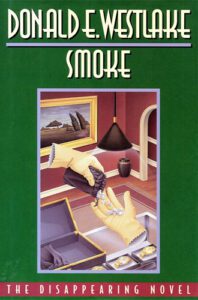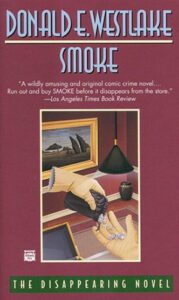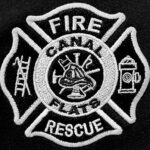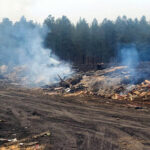Home »

Insightful commentary on the human condition in Smoke
Book Review
By Derryll White
Westlake, Donald E. (1995). Smoke.
“I felt amazingly confident,—it’s not particularly pleasant recalling that I was an ass.”
― H.G. Wells, The Invisible Man
 Donald E. Westlake takes a long time getting to the point. Oh it is all interesting, funny, kind of science fiction scenes where the reader contemplates the various quirky possibilities of invisibility. We have all wished for it at times, right? Think of it – changing rooms, teacher’s exams, wealth beyond measure.
Donald E. Westlake takes a long time getting to the point. Oh it is all interesting, funny, kind of science fiction scenes where the reader contemplates the various quirky possibilities of invisibility. We have all wished for it at times, right? Think of it – changing rooms, teacher’s exams, wealth beyond measure.
It never occurs to the reader that this is simply the prelude to a new world, a world manipulated genetically so that the tobacco industry sheds those predisposed to lung cancer, emphysema and heart failure. Get rid of those human frailties and tobacco will rule the world. With the genetic codes tobacco will abort the problems and rule absolutely.
Invisible Freddy Urban Noon is the mysterious product of tobacco research gone wrong. He goes through all sorts of trials and tribulations. Always there is the struggle of industry to capture and control him. Westlake is pretty clear on the lengths capitalism will go to.
“We’ve spent the last 40 years trying to make cigarettes safe for the human race, and we failed. We can spend the next 40 years making the human race safe for cigarettes,” said head industrialist Merrill Fullerton. Freddy’s take on the whole thing is that it’s hard to look on the sunny side when you’re in a shit storm.
Westlake makes some very insightful comments on the human condition while he exposes the frailty of mankind.
*******
Excerpts from the novel:
 NEW YORK CITY – Behind this door was a large living room with two natural brick walls and two plaster walls painted a kind of dirty white. These weren’t dirty walls, these were walls painted a specific white only found in New York City, variously known as landlord white or cockroach white, it goes on gray and drab, and therefore will always look the way it does the first day it’s spread, and so it doesn’t have to be repainted as often as walls painted more esthetically pleasing colors.
NEW YORK CITY – Behind this door was a large living room with two natural brick walls and two plaster walls painted a kind of dirty white. These weren’t dirty walls, these were walls painted a specific white only found in New York City, variously known as landlord white or cockroach white, it goes on gray and drab, and therefore will always look the way it does the first day it’s spread, and so it doesn’t have to be repainted as often as walls painted more esthetically pleasing colors.
MONEY – “Whaddaya mean, money? Why wouldn’t he want money? You’re telling me they still use wampum up here?”
“Checks,” Peg said. Having lived a more or less normal life until she met Freddie, it was frequently her job to explain the straight world to him. “Nobody uses cash any more,” she explained.
“Whadda they use?”
“When you go to the supermarket, you use your credit card.”
“Don’t have one.”
“I know. When you rent a house, you pay by check.”
“Don’t have a checking account.”
“I know Freddie. We might have to get us one.”
Freddie really and truly didn’t get it. “Why? Peg, cash is money. You know? The green stuff, that’s the actual money.”
“But nobody uses it.”
LOCAL COLOUR – As with most small side-street Manhattan restaurants, this one was built into the ground floor of a former private dwelling, which meant it was long and narrow, with a not very high ceiling. This particular example of the type was warmed with creamy paint and goldish fixtures and woodlike dark trim. The bar was a C-clamp near the front, against the right wall; beyond it, one would go to the dining area with its snowy tablecloths, most of them not in use at this hour.
DEATH – When Harry Cohn, the tyrannical well-loathed head of Columbia Pictures in the thirties and forties, finally passed away there was a huge turnout at his funeral, which led Red Skelton to comment, “It just goes to prove the old saying, Give the people what they want, they’ll come out for it.”
MARIJUANA – “I’d heard,” Peter said delicately, “the industry might shift over to marijuana. Might encourage legalization and –“
“For several reasons, no,” Merrill said. “The zeitgeist is against that, to begin with. In the years since nineteen thirty-six, when marijuana was first made illegal in the United States, to give employment to those government enforcement officials put out of work by the repeal of Prohibition, marijuana has unfortunately become wedded in the popular mind with actual narcotic drugs. Like heroin and cocaine. Also, marijuana contains even more tar than tobacco and may have just as many, though different, negative implications for the human respiratory system. There’s nothing to be gained by switching from a legal health hazard to an illegal health hazard.”
 – Derryll White once wrote books but now chooses to read and write about them. When not reading he writes history for the web at www.basininstitute.org.
– Derryll White once wrote books but now chooses to read and write about them. When not reading he writes history for the web at www.basininstitute.org.







